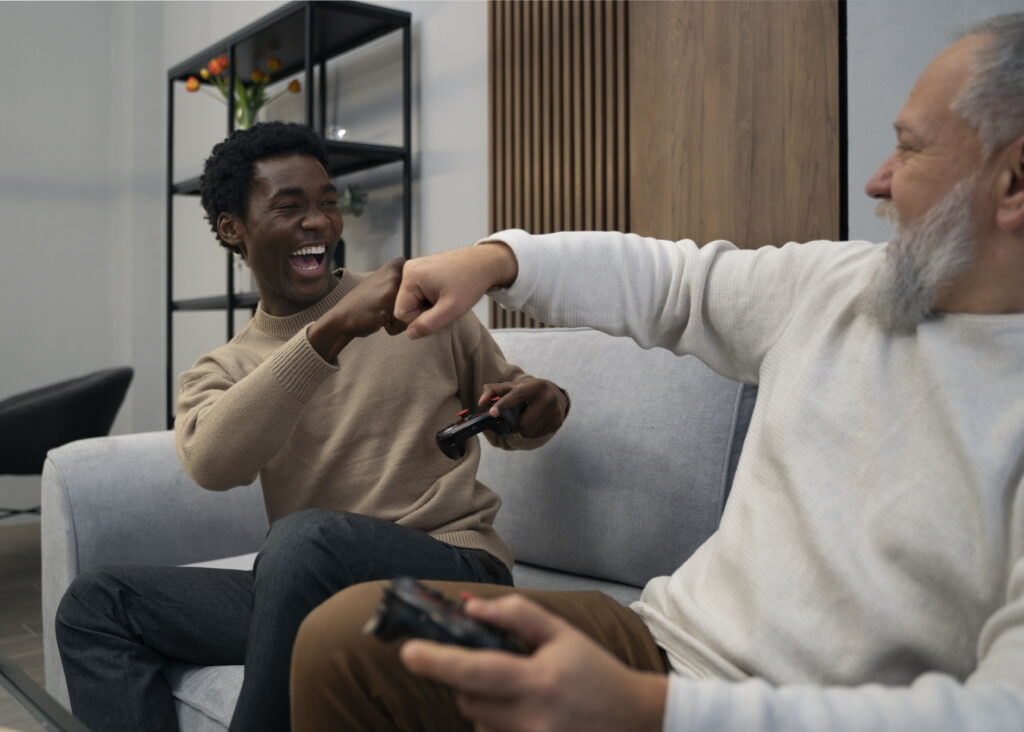Video games have become a major form of entertainment, with millions of people playing daily across the globe. While gaming is often viewed as a fun pastime, there is growing interest in understanding its impact on mental health. Like any activity, gaming can have both positive and negative effects, depending on factors such as the time spent playing, the type of games, and an individual’s personal circumstances.
This article explores how gaming influences mental health, the benefits it can provide, the potential risks, and how to maintain a healthy balance.
The Positive Effects of Gaming on Mental Health
Contrary to some negative stereotypes, gaming can have many positive effects on mental health. When played in moderation and under the right conditions, video games offer emotional, cognitive, and social benefits.
Stress Relief and Relaxation
Many people use gaming as an escape from the stresses of daily life. Immersing yourself in a virtual world can provide a much-needed mental break, reducing anxiety and promoting relaxation. Games like Stardew Valley or Animal Crossing are particularly known for their calming effects.
Cognitive Benefits
Video games can improve mental agility and problem-solving skills. Strategy games like Civilization or puzzle games like Portal challenge players to think critically and adapt to new situations.
Key cognitive benefits include:
- Improved memory and focus.
- Enhanced multitasking abilities.
- Increased creativity through exploration and decision-making.
Social Connections
Online multiplayer games like Fortnite or World of Warcraft foster social interaction by connecting players across the globe. These games create opportunities to build friendships, work as a team, and feel a sense of belonging.
Improved Mood and Mental Health Awareness
Gaming can uplift mood and even contribute to mental health awareness. Some games, such as Celeste or Hellblade: Senua’s Sacrifice, explore themes of mental illness, helping players understand and empathize with these experiences.
The Negative Effects of Gaming on Mental Health
While gaming can be beneficial, excessive or unbalanced gaming may lead to negative outcomes. It’s important to recognize and address these risks to ensure a healthy relationship with video games.
Gaming Addiction
Gaming addiction, also known as gaming disorder, has been recognized by the World Health Organization (WHO). It is characterized by a lack of control over gaming habits, leading to significant impairment in personal, social, or professional life.
Social Isolation
Excessive gaming can sometimes lead to neglect of real-world relationships. Spending too much time in virtual environments may reduce face-to-face interactions, potentially leading to feelings of loneliness.
Sleep Problems
Gaming late into the night can disrupt sleep patterns, causing fatigue and reduced concentration during the day. The blue light emitted by screens may interfere with the body’s production of melatonin, making it harder to fall asleep.
Impact on Emotional Regulation
Highly competitive or violent games may increase stress or aggression in some players. Losing repeatedly or facing toxic players online can also lead to frustration and lower self-esteem.
The Role of Gaming in Mental Health Treatments
Interestingly, gaming is being increasingly used as a tool for mental health treatment. Therapists and researchers are exploring how games can support therapy, provide coping mechanisms, and improve emotional well-being.
Therapeutic Gaming Apps
Games like SuperBetter and Happify are designed to help players build resilience, manage stress, and improve their emotional outlook. These apps use game mechanics to encourage positive behaviors and reward progress.
Virtual Reality (VR) Therapy
VR gaming has opened new doors in mental health treatment. VR simulations are being used to treat anxiety, phobias, and PTSD by creating safe environments where patients can confront their fears.
Rehabilitation and Cognitive Training
Games are being developed to assist individuals recovering from brain injuries or strokes. These games improve cognitive functions like memory, coordination, and attention in an engaging manner.
Balancing Gaming and Mental Health
To enjoy the positive effects of gaming while avoiding the risks, it’s important to maintain a healthy balance. Here are some tips:
Set Time Limits
Establish boundaries for how much time you spend gaming each day. The WHO recommends taking breaks every hour to stretch and rest your eyes.
Choose Games Wisely
Opt for games that align with your interests and emotional needs. If you’re looking for relaxation, choose calming games; if you want a mental challenge, try puzzles or strategy games.
Stay Connected Offline
Make time for real-world interactions. Balance online friendships with face-to-face connections to ensure a well-rounded social life.
Be Mindful of Content
Some games may include themes or mechanics that can negatively affect your mood or stress levels. Pay attention to how you feel during and after gaming sessions.
Encourage Open Conversations
Talk about gaming with friends or family members. Open discussions can help address concerns and reduce the stigma around gaming and mental health.
Gaming and Mental Health in Children and Adolescents
Children and teenagers are particularly vulnerable to both the positive and negative effects of gaming. For young players, gaming can improve hand-eye coordination, foster creativity, and provide a sense of accomplishment. However, it can also lead to issues such as:
- Academic Decline: Excessive gaming may take time away from studying.
- Behavioral Changes: Aggressive or withdrawn behavior can emerge from unhealthy gaming habits.
Parental Guidelines
- Monitor gaming content for age-appropriateness.
- Encourage outdoor activities and hobbies to balance screen time.
- Foster open communication about gaming preferences and habits.
Conclusion
The impact of gaming on mental health is complex and multifaceted. On the one hand, gaming offers stress relief, cognitive stimulation, and social interaction. On the other hand, excessive gaming can lead to addiction, isolation, and emotional challenges.
By understanding the effects of gaming and taking steps to balance it with other aspects of life, players can enjoy its benefits while minimizing the risks. As research continues to evolve, gaming may become an even more powerful tool for enhancing mental health and well-being.



